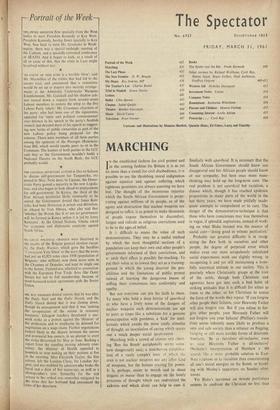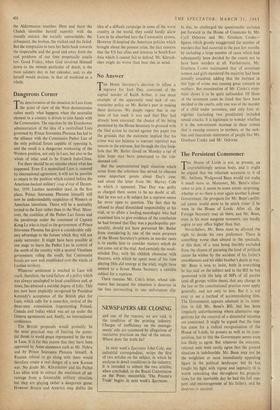MARCHING
IN the established fashion for civil protest and in the coming fashion (in Britain it is as yet no more than a trend) for civil disobedience, it is possible to see the throbbing moral indignation against injustice and against suffering which righteous pessimists are always asserting we have lost. The thought of the monstrous injustice which the South African Government is perpe- trating against millions of its people, or of the agony and destruction that nuclear weapons are designed to inflict, is as potent to make thousands of people expose themselves to discomfort, fatigue and ridicule as religious convictions used to be in the ages of belief.
It 1:: difficult • to assess the value of such demonstrations. They may be a useful method by which the most thoughtful sections of a population can keep their own and other people's governments informed of their convictions, and such their effect is possibly far-reaching. To put their value at its lowest they act as a training- ground in which the young discover the pos- sibilities and the limitations of public protest instead of learning the dangerous lesson of stifling their consciences into conformity and apathy.
But not everyone can pin his faith to them. To many who hold a deep horror of apartheid or who have a lively sense of the dangers of nuclear weapons such demonstrations are apt to seem at times like a substitute for a genuine preoccupation with goodness, a 'kick' for intel- lectuals which avoids the more costly stimulus of thought, an inoculation of caring which spares one a much deeper social involvement Marching with a crowd of cronies and chant- ing 'Ban the Bomb' antiphonally seems some- how dangerously easy, a treacherous simplifica- tion of a vastly complex issue of which the crux is not nuclear weapons nor any other kind of weapons, but the human craving for power. It is, perhaps, easier to march and to shout slogans en masse than to engage on the lonely processes of thought which can understand the sickness and which alone can help to cure it. Similarly with apartheid. It is necessary that the South African Government should know our disapproval and her African people should know of our sympathy, but here once more mass- thinking may hold up the long-term cure. The real problem is not apartheid but racialism, a disease which, though it has reached epidemic proportions in many parts of the world in the last thirty years, we have made pitifully inade- quate attempts to comprehend or to cure. The danger of the demonstration-technique is that those who have consciences may lose themselves in vague, if splendid, aspirations, instead of work- ing on what Blake insisted was the essence of social cure—'doing good in' minute particulars.'
Probably our greatest difficulty is in recog- nising the flaw both in ourselves and other people, the degree of perpetual error which makes even our most scrupulously calculated social experiments work out slightly wrong; in recognising it and yet still maintaining a hope- fully uncynical attitude to our society. This is precisely where Christianity grasps at the root of the nettle, though both Christians and agnostics have got into such a bad habit of striking attitudes that it is difficult for either to listen to the other, or for Christians to notice the force of the words they repeat. `If you forgive other people their failures, your Heavenly Father will also forgive you. But if you refuse to for- give other people, your Heavenly Father will not forgive you your failures' (Phillips's transla- tion) seems infinitely more likely to produce a sane and safe society than a reliance on flogging, hanging or still more terrible forms of deterrent. Similarly. 'Be ye . therefore. all-inclusive, even m your Heavenly Father is all-inclusive' (Neihuhr'c interpretation of Matthew v 48) sounds like a more probable solution to East- ti relations or to racialism than concentrating all one's moral energies on the Bomb. or brawl- ing with Mosley's supporters on Sunday after- noons.
Yet Blake's insistence on minute particulars returns to confront the Christian no less than
the Aldermaston marcher. Here and there the Church identifies herself superbly with the morally outcast, the socially untouchable, the delinquent, the broken, the wicked and the failed. But the temptation to turn her helm back towards the respectable and the good and away from the real problems of our time perpetually assails her. Good Friday, when God involved Himself down to the minute particular of death, is the most salutary day in her calendar, and, as she herself would declare, in that of mankind as a whole.



































 Previous page
Previous page